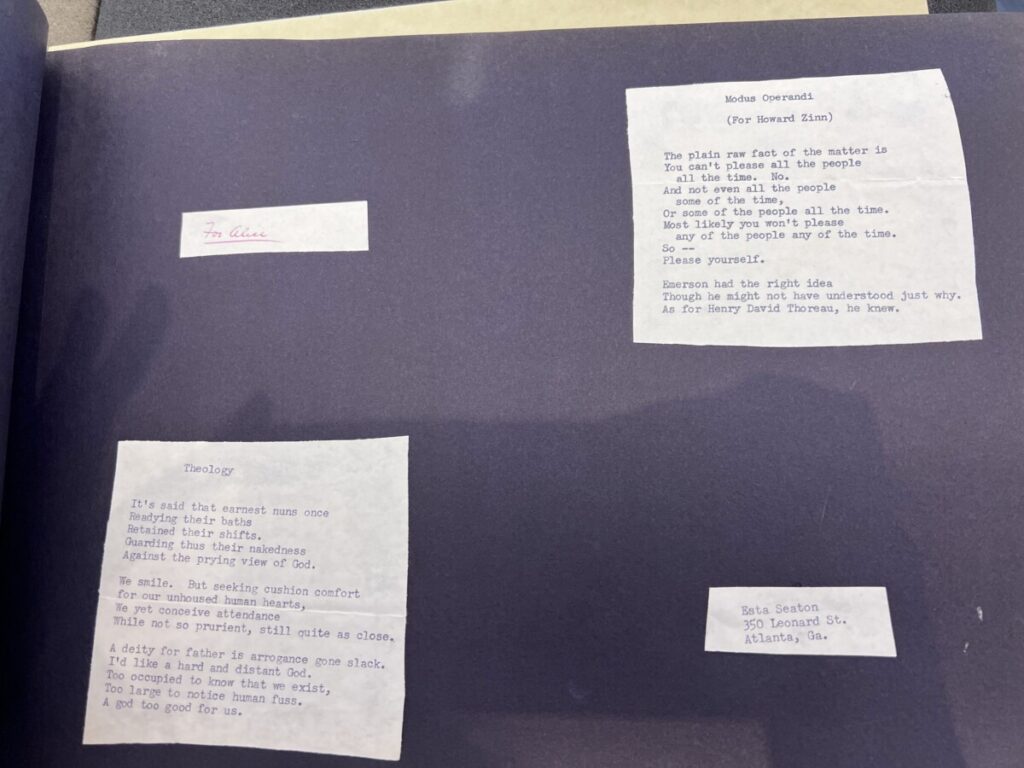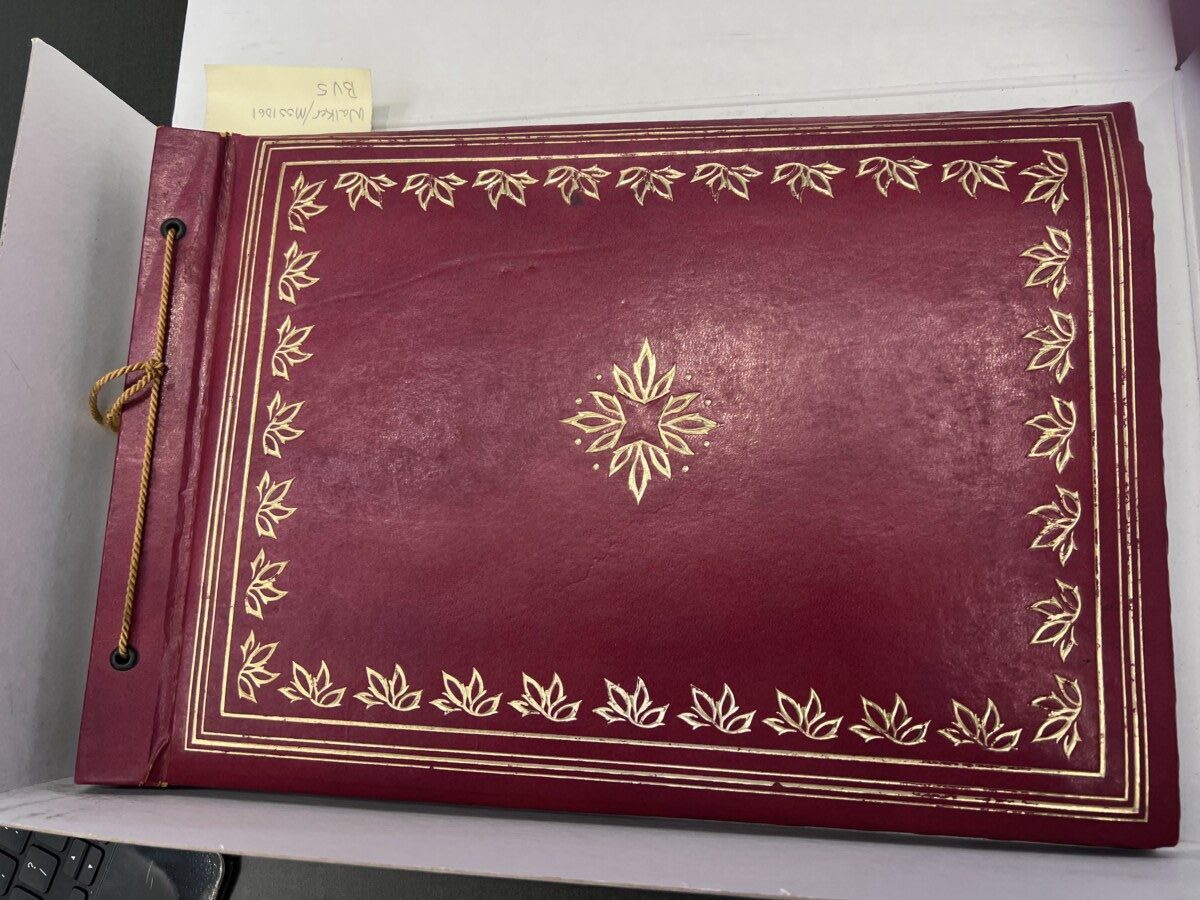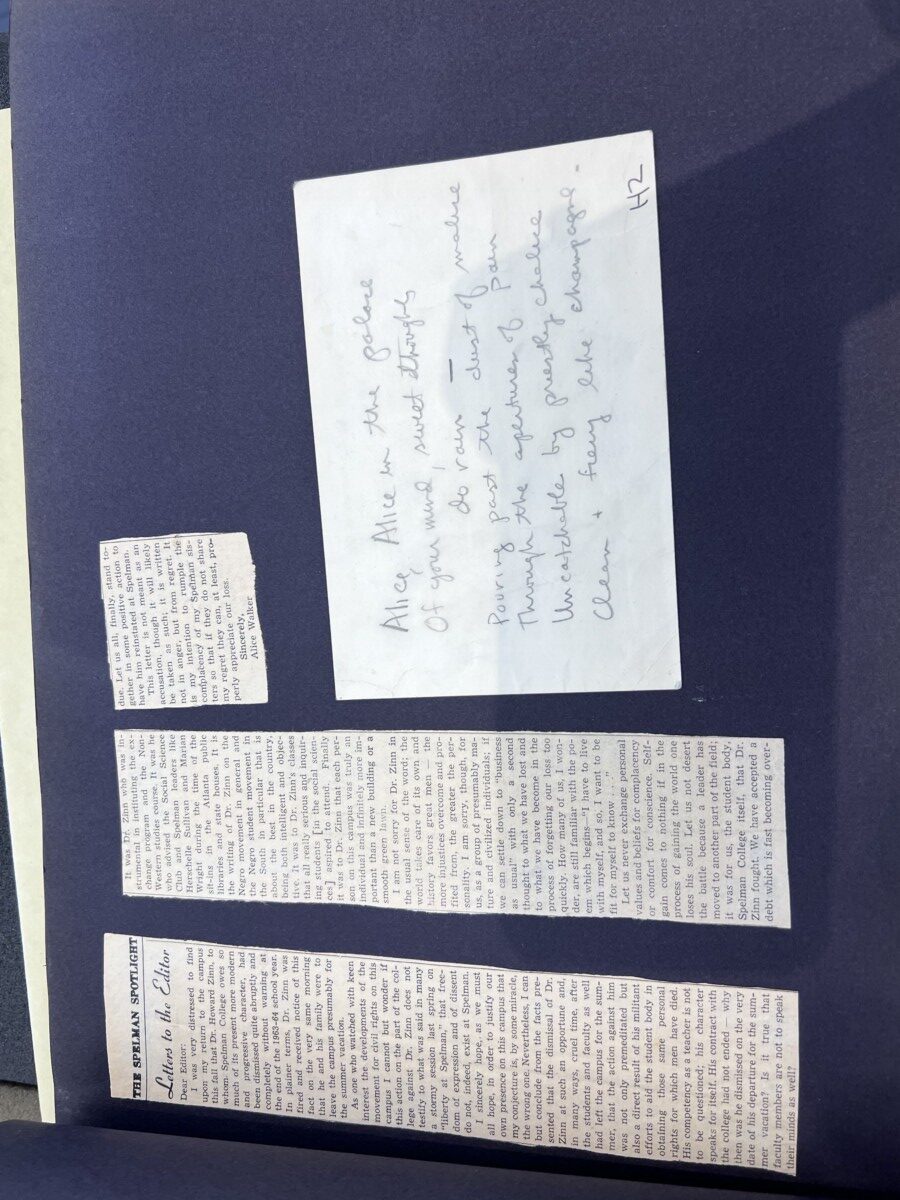Within Alice Walker’s scrapbook lies proof of the powerful relationship between celebrated author and activist, Alice Walker, and her mentor, Howard Zinn. This scrapbook, created and designed by Alice Walker in 1963, serves as a narrative of the connection between Zinn and Walker.
Alice Walker attended Spelman College on academic scholarship from 1961-1963. Her academic journey at Spelman College was significantly shaped by her decision to enroll in Professor Howard Zinn’s class[1]. Despite initial skepticism from other faculty members and Walker’s lack of verbal participation in class, Zinn recognized Walker’s immense writing potential and appointed himself as her mentor[2]. The scrapbook documents this mentorship and reflects the extent to which Zinn believed Walker could one day become a promising writer.
Woven into the fabric of this scrapbook are exchanged poems between Walker and Zinn. These writings serve as a testament to the intellectual and emotional connection between Walker and Zinn. Zinn’s first poem in the scrapbook was labeled “For Alice,” in his original handwriting. The poem was titled “Theology,” and comprised of three 4–5-line stanzas. Alice wrote the poem “Modus Operandi” in response, in which she discussed the topic of “people-pleasing.” Although these poems were typed and formatted with careful detail, their placement within the scrapbook was relatively messy, indicating that little time was spent on the physical appearance of the scrapbook pages.
In a significant turn of events, when Spelman College decided to fire Howard Zinn, Alice Walker composed a passionate letter to the college newspaper. This letter, as seen in the scrapbook, was published in “The Spelman Spotlight” under the title “Letters to the Editor.” This letter, preserved within the scrapbook, avidly defended Zinn’s contributions to education and protested his dismissal, shedding light on the intensity of the mentor-mentee bond.
Walker’s article in “The Spelman Spotlight” condemned Spelman College for conducting faculty decisions based solely on political events as opposed to a more holistic approach. Walker then listed Zinn’s countless contributions to the college, both academic and community based. Walker asked that her article not be seen as an accusation, but instead as an opportunity to look within and determine what is right for the “presumably mature and civilized individuals” of Spelman College.
In response to Walker’s article, Zinn composed a poem of gratitude. It was handwritten and pasted alongside the article within the scrapbook. Zinn’s poem sung praise for Alice’s attempt to have Zinn reinstated as a professor: “Alice, Alice, in the palace / Of your mind, sweet thoughtfully do rain.” Her efforts proved, although thoughtful, fruitless. Howard Zinn was not reinstated as a professor[3] at Spelman College, but his appreciation for Walker was not left unnoticed.
From the first year that Alice Walker attended Spellman College, she became an advocate for destroying segregation. Zinn stood alongside Walker’s resistance and mentored her throughout the process. Therefore, when Zinn was “fired for his advocacy work,” Walker immediately unenrolled from Spelman College and switched to Sarah Lawrence College on full academic scholarship[4].
This scrapbook celebrated the connection between Walker and Zinn but failed to mention the controversy surrounding Howard Zinn and his dismissal from the college. While widely admired for his activism and scholarship, Zinn also faced criticism due to his political stance and interpretations of history[5]. The scrapbook merely documents Walker’s frustration with the school’s choice to value Zinn’s political stance over his teaching abilities.
Howard Zinn was labeled positively as both an activist and successful author; however, following the release of his controversial book and his jailtime for protesting the Vietnam War, he was renamed as a cult figure. Zinn was most recognized for his book: A People’s History of the United States. Over half a million copies of Zinn’s book were sold, but it cost him his job at Spelman College and his otherwise positive reputation as a political activist. Zinn was the first person to publish the idea that Christopher Columbus was nothing other than a “warmongering white guy.” Despite his negative reputation at the time, many scholars later determined that Zinn’s opinion was politically correct and ahead of its time[6].
The scrapbook itself is a work of art: its exterior is decorated with a rich, deep red cover that is leathery-soft to the touch. Intricately detailed in gold, the cover of the scrapbook hints at its significance, as if each element of the design is a symbol of the importance of Walker’s relationship to Zinn. Upon opening the scrapbook, the thick, dark blue pages crafted from construction paper form a contrasting backdrop against the white paper glued inside.
The pages are decked with poems and articles, but these additions are not neatly pasted in; rather, they appear to be glued somewhat carelessly, as if their placement was an afterthought. This hasty, imperfect assembly feels authentic and personal, as if it were more of a private journal than a carefully curated collection. The scrapbook itself also includes a fair number of blank pages, potentially indicating that the scrapbook was never finished or that the topic at hand lacked enough material to fill the pages. These empty spaces, whether purposeful or not, allow space for interpretation and reflection on what might have been left unsaid about Walker’s and Zinn’s relationship.
This scrapbook encapsulated the beauty of the mentorship of Alice Walker by Howard Zinn and represents the lasting effect Zinn had on Alice Walker’s authorial journey. Zinn was only one of numerous distinguished individuals who knew Walker at a young age and were touched by both her friendship and intellectual brilliance. This scrapbook stands as a compelling piece of historical and personal analysis.
[1] Trembath, “Teaching Black Lives in College When Black Lives Didn’t Matter That Much K through 12,” 20
[2] Winslow, “Review of Rethinking America’s Past: Howard Zinn’s A People’s History of the United States in the Classroom and Beyond, by Robert Cohen and Sonia Murrow,” 73
[3] Mehren, “PROFILE: Howard Zinn, Activist, Author; Now Hollywood is Calling.; Past Imperfect; Howard Zinn’s Controversial View of American History has made Him a Cult Figure—and His Book the Basis of a 10-Part Miniserie: {Home Edition],” 1
[4] Okeyo, “New Alice Walker Doc Delivers Good Medicine: A New PBS Documentary about Writer Alice Walker Finally Tells Her Powerful Story and has Already Moved Audiences with its Message Writes Agunda Okeyo,” 2
[5] Mehren, “PROFILE: Howard Zinn, Activist, Author; Now Hollywood is Calling.; Past Imperfect; Howard Zinn’s Controversial View of American History has made Him a Cult Figure—and His Book the Basis of a 10-Part Miniserie: {Home Edition],” 2
[6] Mehren, “PROFILE: Howard Zinn, Activist, Author; Now Hollywood is Calling.; Past Imperfect; Howard Zinn’s Controversial View of American History has made Him a Cult Figure—and His Book the Basis of a 10-Part Miniserie: {Home Edition],” 2
Bibliography
Mehren, Elizabeth. “PROFILE: Howard Zinn, Activist, Author; Now Hollywood is Calling.; Past Imperfect; Howard Zinn’s Controversial View of American History has made Him a Cult Figure–and His Book the Basis of a 10-Part Miniserie: [Home Edition].” Los Angeles Times, Dec 14, 1998. https://login.proxy.library.emory.edu/login?url=https://www.proquest.com/newspapers/profile-howard-zinn-activist-author-now-hollywood/docview/421349950/se-2.
Okeyo, Agunda. “New Alice Walker Doc Delivers Good Medicine: A New PBS Documentary about Writer Alice Walker Finally Tells Her Powerful Story and has Already Moved Audiences with its Message Writes Agunda Okeyo.” The Newsweek/Daily Beast Company LLC.
Trembath, Sarah. “Teaching Black Lives in College When Black Lives Didn’t Matter That Much K through 12.” The Radical Teacher, no. 116 (2020): 18–25. https://www.jstor.org/stable/48694758.
Walker, Alice. Scrapbook, 1963-1964 [includes poetry by A.W. and Howard Zinn]. 1963. Box BV5. Manuscript Collection No. 1061. Stuart A. Rose Manuscript, Archives, and Rare Book Library, Emory University. 13 October 2023.
Winslow, Barbara. Review of Rethinking America’s Past: Howard Zinn’s A People’s History of the United States in the Classroom and Beyond, by Robert Cohen and Sonia Murrow. The Radical Teacher, no. 125 (2023): 71–74. https://www.jstor.org/stable/48728378.


